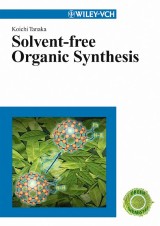Details
Solvent-free Organic Synthesis
1. Aufl.
|
165,99 € |
|
| Verlag: | Wiley-VCH (D) |
| Format: | |
| Veröffentl.: | 06.03.2006 |
| ISBN/EAN: | 9783527605361 |
| Sprache: | englisch |
| Anzahl Seiten: | 442 |
DRM-geschütztes eBook, Sie benötigen z.B. Adobe Digital Editions und eine Adobe ID zum Lesen.
Beschreibungen
The demand for increasingly clean and efficient chemical syntheses is continuously becoming more urgent from both an economic and an environmental standpoint. So-called green technologies are looking for alternatives, yet they focus on large quantities of hazardous even toxic solvents. One could even say that the best solvent is no solvent. <br> It is against this background that chemical synthesis without the use of solvents has increasingly developed into a powerful methodology. Once the chemical reactivity is increased, the amount of initial substances needed is reduced; in particular it removes the need for the complex recycling and disposal of solvents.<br> In this book, the third in our open "Green Chemistry" series, Koichi Tanaka describes the latest developments in this exciting field. Packed with advice on applications, this will be equally useful to practitioners in research as well as process chemists in industry, such that it is sure to become an invaluable reference source.
Reduction. <p>Oxidation.</p> <p>Carbon-Carbon Bond Formation.</p> <p>Carbon-Nitrogen Bond Formation.</p> <p>Carbon-Oxygen Bond Formation.</p> <p>Carbon-Sulfur Bond Formation.</p> <p>Carbon-Phosphorus Bond Formation.</p> <p>Carbon-Halogen Bond Formation.</p> <p>Nitrogen-Nitrogen Bond Formation.</p> <p>Rearrangement.</p> <p>Elimination.</p> <p>Hydrolysis.</p> <p>Protection.</p> <p>Deprotection.</p> <p>List of Journals.</p> <p>Subject Index.</p>
"Solvent-free Organic Synthesis is a long-needed and timely compilation of experimental procedures that do not use solvents during the reaction step. Even better, it also includes numerous syntheses that do not require solvents after the reaction for extraction, chromatography, or recrystallization, because they yield pure products in the absence of auxiliaries...This is a must-have book for all students (perhaps through libraries) and academic or industrial researchers who honestly want to use and improve sustainable syntheses, and can also be recommended for administrators and referees who control the funding of such endeavors for the well-being of our environment." (Gerd Kaupp, Organic Chemistry I, University of Oldenburg (Germany), <i>Angewandte Chemie/International Edition</i>, 40/03) <p>"...an excellent and exhaustive overview compilation...highly recommended to all those concerned with Green Chemistry as a valuable resource..." (<i>Synthesis</i>, No. 16, 2003)</p> <p>"... a long-needed and timely compilation...this is a must-have book for all students and academic or industrial researchers." (<i>Angewandte Chemie Intl.</i>)</p> <p>"...offers graphical summaries of 537 examples of solvent-free organic reactions..." (<i>Journal of the American Chemical Society</i>, Vol. 125, No. 39)</p> <p>"In conclusion, this book constitutes an essential handbook in an excellent and exhaustive overview compilation. It is highly recommended to all those concerned with Green Chemistry as a valuable resource in the field." (A. Loupy, Paris-South University and CNRS, France, <i>Synthesis</i>, 2003, No. 16)</p>
<p>Koichi Tanaka is a Japanese engineer who shared the Nobel Prize in Chemistry in 2002 for developing a novel method for mass spectrometric analyses of biological macromolecules with John Bennett Fenn and Kurt Wüthrich.
The demand for increasingly clean and efficient chemical syntheses is continuously becoming more urgent from both an economic and an environmental standpoint. So-called green technologies are looking for alternatives, yet they focus on large quantities of hazardous even toxic solvents. One could even say that the best solvent is no solvent. <p>It is against this background that chemical synthesis without the use of solvents has increasingly developed into a powerful methodology. Once the chemical reactivity is increased, the amount of initial substances needed is reduced; in particular it removes the need for the complex recycling and disposal of solvents.</p> <p>In this book, the third in our open “Green Chemistry” series, Koichi Tanaka describes the latest developments in this exciting field. Packed with advice on applications, this will be equally useful to practitioners in research as well as process chemists in industry, such that it is sure to become an invaluable reference source.</p>


















